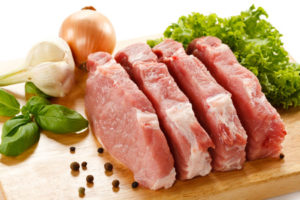Nutritional Information About Pork
 Pork in its natural form is low in sodium chloride and has rich protein content. It is also a source of substances that a healthy body needs (minerals like iron, phosphorus, potassium, magnesium and zinc, B vitamins such as B6, B12, nicotinic acid, thiamine and riboflavin).
Pork in its natural form is low in sodium chloride and has rich protein content. It is also a source of substances that a healthy body needs (minerals like iron, phosphorus, potassium, magnesium and zinc, B vitamins such as B6, B12, nicotinic acid, thiamine and riboflavin).
• Protein
A portion of 100 g pork meat represents about half of the daily protein requirements of an adult body.
• Fats
The fat content of the pork meat depends on the part from which it comes (chest, chop, etc.). Pork contains less saturated fats and more unsaturated fats. It also contains conjugated linoleic acid, used to help the body fight against diseases.
• Iron
Pork is also rich in iron; a portion of 100 g of pork meat provides about 15% of the daily iron requirements.
• Zinc
The consumption of 100 g of pork provides 30% of the daily zinc requirements. According to recent studies, people who exclude meat from any type of diet have zinc deficiency; Zinc, iron and vitamin D that exist in red meat are absorbed more efficiently by the body, unlike in the case of other foods that contain them.
Additionally, with the content of essential antioxidants, pork provides better immunity to the body.
If you are looking for a healthy, premium honey baked ham, check out the Hickory Baked Ham Company for the best mouth-watering ham, bacon, turkey, and wild game products!
Article Source over here: Nutritional Information About Pork
Comments
Post a Comment